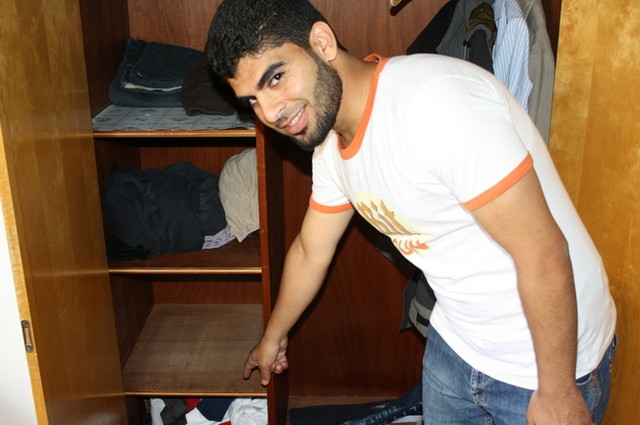By Karim El-Bar
Muhannad said he couldn’t keep the cash he had discovered in the wardrobe because his religion forbids it
A Syrian refugee living in Germany discovered €150,000 ($166,500) in an old wardrobe donated by a charity earlier this week – then handed the cash over to police, German media reported.
The 25-year-old, who has been identified only as Muhannad M, told reporters that his religion forbade him from keeping the money.
“For the police and city, he is the hero of the day,” police spokesman Ralf Steinmeyer, 55, said in a statement released on Tuesday.
Muhannad, whose family is still living in Syria, hails from al-Houla, near Homs.
Al-Houla was the site of one of the Syrian uprising’s bloodiest massacres in 2012, when the army and pro-government militias killed 108 people, including 34 women and 49 children, according to UN figures. Most victims were summarily executed.
Muhannad reportedly reached Germany last October before gaining refugee status and being transferred to the town of Minden.
It was in this community of about 83,000 people, in western Germany, that the Syrian made his extraordinary discovery.
Muhannad had just moved into a flat paid for by a job centre and started to furnish his apartment with donations from charities.
While assembling and cleaning the donated wardrobe, he found a secret compartment made up of two boards screwed together. Inside he found the money.
“They were all new €500 notes. I thought it was fake money,” he told the German newspaper Bild, describing the €50,000 in cash he found inside the compartment.
He also found five savings books worth €100,000, bringing the total amount to €150,000.
After a brief internet search, and a crash course in telling fake money from real ones, he realised the cash was genuine.
If he was uncertain at first whether the money was real, he certainly had no qualms about what to do next.
“I am a Muslim. I’m not allowed to keep this money. My religion forbids it,” he told Radio Westphalia.
He alerted the local migration authorities who, in turn, informed the police.
“Allah would never allow me to finance my own interests with someone else’s wealth,” he added.
Police have identified the owner of the money, according to German daily Die Welt, and are still attempting to make contact.
“People often report small amounts of money found to the police,” Steinmeyer said. “But such a large sum is absolutely exceptional.”
“This young man has behaved in an exemplary manner and deserves great credit,” he added.
Muhannad is currently enrolled in a German language course and aims to study for a master’s degree in Germany, having finished his university studies in Syria in communications technology.
No good deed goes unpaid, however, as he will receive three percent of the value of the money he handed over – €4,500.
But Bild reported that it is possible the finder’s fee will be offset against the job centre’s overheads. Perhaps no good deed goes unpunished.
Karim El-Bar is an Egyptian-British, London-based staff writer/editor focused on the Middle East.
29 June 2016

